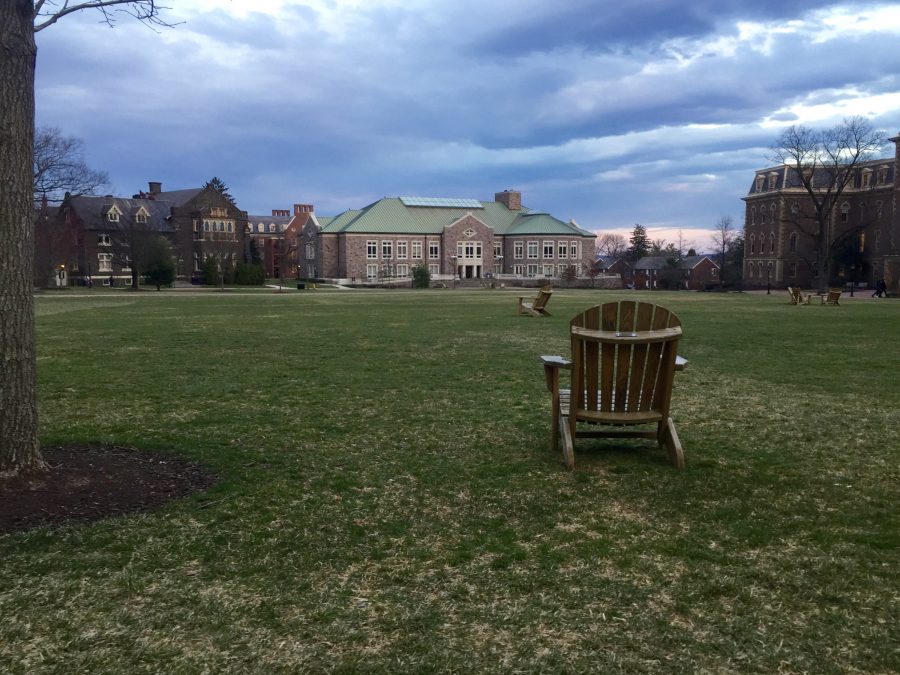The events in this story reflect the situation of COVID-19 as of Wednesday, March 11.
From March 16 through April 5, all Lafayette College events and all non-essential college-sponsored travel will be canceled, and from March 23 to April 5, all classes will be conducted remotely. Several other institutions have made similar decisions this week regarding how to proceed for the remainder of the spring semester in response to the COVID-19 outbreak.
President Alison Byerly announced the college’s decision in an email on Wednesday detailing the closing of Lafayette for the two weeks following spring break. The email stated that room and board will be provided to students from countries with travel restrictions and those with extenuating circumstances.
Classes will be held virtually over the two weeks following the break, which will allow students to complete their classes for the semester and graduate on time, Byerly explained in the email. Students were encouraged to take home any necessary course materials as well as any other essentials such as passports and medications when they leave campus for spring break.
There are currently no confirmed cases on campus of students with COVID-19, but on Tuesday one student was tested by the New Jersey Department of Health for coronavirus after having tertiary exposure to someone who tested positive, according to Director of Health Services Jeffrey Goldstein.
“A few [students have come in for coronavirus testing], so I have to sort of do education counseling about when it’s appropriate to do the test,” Goldstein said. “What I don’t want to happen is to test irrationally for people just want to test done and have the labs inundated with inappropriate testing.”
As of Wednesday, tests for COVID-19 have become commercially available, meaning Lafayette can test students for the disease and send it to a national lab to get tested, Goldstein explained.
Students with extenuating circumstances can apply to stay on campus using an open-ended form available on MyHousing that will be reviewed on an individual basis. Students were given three days to complete the form, beginning Wednesday when it was originally released. There is no clarification of what the requirements are for students to stay on campus.
According to an email from Timothy Uhrich, assistant director of residence life, “If approved to stay, our expectation is that if you are registering to live here for the full 3 week period: you will stay here continuously throughout that time and will not travel away from campus by day or overnight.”
“Discretionary travel during this time may pose unnecessary risks to others in our community,” he added.
“I think most of us [international students] are going to be on campus by a mile,” Saeed Malami ’20, president of the International Student Association (ISA) said. “[Resources on campus over breaks] have gotten a lot better in my time here…I’ve seen things progressively get better.”
Lafayette is not alone as colleges around the country are canceling classes and events, and making plans for how to conduct courses for the rest of the semester. Several have moved to temporary periods of remote, digital learning similar to Lafayette, including Lehigh, Haverford, and Penn State. However, several other institutions including Bucknell, Fordham, Muhlenberg and Amherst have made the decision to move to remote learning for the remainder of the entire spring semester.
“All of those decisions have to be made in the context of what kind of campus you are, where people are coming from,” Byerly said. “But we’re starting to make contingency plans for what sorts of events we would reconfigure if it didn’t seem like a good idea to hold large admissions events and things of that nature.”
The greatest number of people who contract the virus–about 80 percent–have very minimal symptoms, and the age group least at risk is that of college-age students, Goldstein explained.
“[Young adults] are the people that are probably most actively shedding and spreading to other people because they are not taking precautions because they don’t feel that sick,” Goldstein said.
Although the students are a young population and a low-risk group, Lafayette employs many older staff members who are in a higher-risk category, Byerly said.
“We want to bear in mind that in addition to considering the actual direct impacts on our campus, we want to be responsible from a public health perspective, recognizing that if we felt that after spring break people’s travels had placed us more at risk, we might do more kind of social distancing of you know, creating fewer large events or we’re doing some things differently,” Byerly said.
According to Vice President of Finance and Administration Roger Demareski, Lafayette has the financial resources they need to handle the unprecedented situation on campus. He said Lafayette is a “financially healthy institution” and is able to adjust to and “ride out” these issues.
“[The financial contingency] is built into the budget for unplanned, unanticipated events. Whether it’s coronavirus, norovirus, an emergency repair, a shortfall in revenue,” Demareski said. “One percent of our gross revenue is a contingency and that’s meant to address these conditions.”
In addition to higher education institutions implementing policies to help contain the virus, on Wednesday night, President Donald Trump announced that all air travel from Europe, excluding Britain, has been halted for 30 days in order to tackle the virus and lessen its economic impact.
The air travel restriction directly impacts US students who are currently studying in Europe, when they will be able to or have to return, and what the protocol will be when they arrive back in the US.
“Our expectation is that for students that are returning from countries that are considered to be level three, that would trigger a communication to self-isolate away from campus for a period of two weeks which is the upper range of isolation,” Goldstein said.
While home for the two weeks after spring break, Goldstein explained there are multiple layers involved in planning for safety.
“The foremost starts with what we’ve been communicating over and over and over again, just personal hygiene, cough etiquette,” Goldstein said. “The second layer is taking personal responsibility and if or when one gets sick to self-isolate if you develop a cough or fever and see your provider so that you’re not transmitting an infectious disease.”








































































































